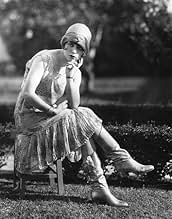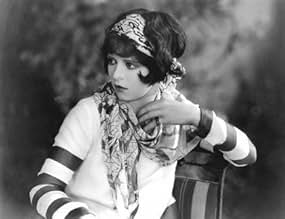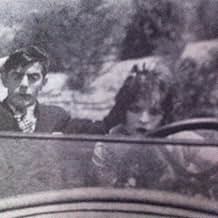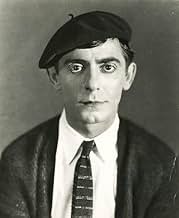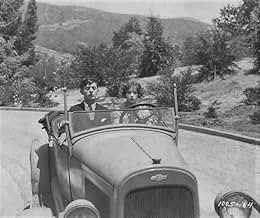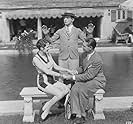Añade un argumento en tu idiomaA salesman is helped out of a jam with an angry customer by a wealthy playboy. In return, he agrees to help the playboy get a divorce from his wife, only to find himself falling for the girl... Leer todoA salesman is helped out of a jam with an angry customer by a wealthy playboy. In return, he agrees to help the playboy get a divorce from his wife, only to find himself falling for the girlfriend of the customer who got him in trouble in the first place.A salesman is helped out of a jam with an angry customer by a wealthy playboy. In return, he agrees to help the playboy get a divorce from his wife, only to find himself falling for the girlfriend of the customer who got him in trouble in the first place.
- Dirección
- Guión
- Reparto principal
- Premios
- 2 premios en total
- Eleanor's Lawyer
- (as Harry Van Meter)
- Unknown Role
- (sin acreditar)
- Tailor
- (sin acreditar)
- Physical Therapist
- (sin acreditar)
Reseñas destacadas
At the resort Tom meets a girl that he falls for, and Kid Boots runs into Clara McCoy again, still accompanied by her brutish boyfriend. Clara prefers Kid Boots because she "prefers reliable men to good-looking ones" a title card tells us. At the resort Tom's ex-wife and her lawyers soon follow, along with all of the comic routines and mix-ups that you're accustomed to seeing in Cantor's sound films, if you've been fortunate enough to view those rarely seen comic gems. The film is quite good and it didn't surprise me that it was a Paramount silent that someone else had restored and presented.
Well, oddly enough, he did. Kid Boots, the movie, is a highly enjoyable confection that packs a lot of laughs into its brisk 60-minute running time and never wears out its welcome. Mr. Cantor comes off surprisingly well in his silent incarnation, throwing himself into some strenuous-looking physical routines and emphasizing his trademark look of pop-eyed surprise at key moments without overdoing it. It helps that the writers equipped him with a steady supply of sight gags, some of which may be a tad familiar to silent comedy buffs but which still prompt laughter today. (I was lucky enough to see this film with an audience, and can attest that it's a real crowd-pleaser.) It also helps that the supporting cast offers notable examples of what was called 'feminine pulchritude' at the time: Eddie is paired with the one and only Clara Bow, seen here just as her career was starting to accelerate. Eddie and Clara make an unexpectedly credible couple, both bright-eyed and exuberant. They have a classic "meet cute" scene when Eddie, who plays a tailor's assistant, accidentally sews his suspenders to her dress and then pulls her along behind himself when he has to leave in a hurry. Also on hand is the exquisitely pretty Billie Dove, who unfortunately isn't given much to do, as well as fiery Natalie Kingston, a veteran of the Mack Sennett Studio, who plays 'bad girl' Carmen Mendoza. We're told by a sassy title card that Carmen has Missouri legs, "the kind that have to be shown," and a nice lazy pan shot of Miss Kingston provides that service. I guess the filmmakers were trying to compensate for the loss of the stage show's dancing girls; in any case, I'm not complaining!
The plot, as might be anticipated, isn't what you'd call substantial. Eddie, a hapless fellow known as "Kid Boots," is rescued from a bully by a handsome young playboy named Tom; in return, Kid agrees to help Tom get a divorce from his gold-digging wife. (It's made clear that the scheming wife, the aforementioned Carmen Mendoza, tricked Tom into marriage and that they've never actually lived together; so, in short, Tom's a decent chap who simply found himself in a spot of trouble.) Most of the story takes place at a scenic mountain resort, a setting which allows for gags on the golf course, gags by the pool, and more gags in the lobby. The thin plot is really just an excuse for comedy routines, and happily there are some good ones along the way. I especially liked the bit where Eddie succeeds in convincing Clara that he's with another woman by positioning himself next to an open door, rolling up one sleeve and playing the half-concealed "woman" himself. I also enjoyed the scene in the resort's clinic, where Eddie finds himself on the massage table, manhandled by a masseur who turns out to be the bully from the opening sequence, jealous of Clara and eager for revenge. (Chaplin fans will be reminded of a similar routine in his 1917 comedy The Cure.) It all winds up with a breakneck, race-to-the-rescue horseback chase over a winding mountain trail, which leads in turn to some Harold Lloyd-style thrill comedy. One moment, Eddie and Clara are dangling from a rope off a precipice, with a single parachute between them, and the next they've managed to save themselves, untangle the plot, help out good old Tom and defeat that no-good Carmen, all in the space of the film's last five minutes.
This movie is just the thing to lift your mood on a rainy afternoon. Cantor's follow-up feature Special Delivery is also enjoyable, but I'd rank this one a notch or two higher. Kid Boots, like its lead players, is cute as a button, short and sweet.
At the club, Cantor goes crazy for Ms. Bow while Gray romances beautiful Billie Dove (as Eleanor Belmore), the boss' daughter. Meanwhile, Gray's leggy wife Natalie Kingston (as Carmen Mendoza) checks into the room next to her husband, to cause trouble. She proceeds to "vamp" Cantor aside, in order to spend the night alone with Gray; if she is able to do this, their divorce won't become final, and she can partake of his inherited millions. Cantor must save Gray and win Bow.
This was a successful film debut for stage star Cantor, who might have joined Chaplin, Keaton, and Lloyd if this had been released a decade earlier. As a film, "Kid Boots" may not equal the best of those other comedians' works, but you can see Cantor had the silent stuff. Most impressive is the film's exciting end, which features a very impressive cliff-hanging sequence. This is pure cinema, but Cantor includes great stage bits, too. How he makes Bow jealous, and scenes with Mr. Waite are highlights.
******** Kid Boots (10/4/26) Frank Tuttle ~ Eddie Cantor, Clara Bow, Malcolm Waite, Lawrence Gray
Cantor, born and raised in New York City, dove into the entertainment business early on, displaying a knack of singing and slinging jokes in saloons, where a young Jimmy Durante played piano for his act. He graduated to vaudeville before producer Florenz Ziegfeld slotted him into his 'Ziegfeld Follies of 1917.' Working alongside Will Rogers, Fanny Brice and W. C. Fields, Cantor proved his worth with his melodic voice and his sense of self-deprecating humor. When on tour, he briefly dated future 'Valley of the Dolls' author Jacqueline Susann.
His prominence in the 1923 play 'Kid Boots' showcased his talents even more. Inventor Lee De Forest hired Cantor to appear in one of his first sound movie recordings to demonstrate his recent invention Phonofilm. Eddie sings two songs from the play 'Kid Boots.' De Forest's "A Few Moments with Eddie Cantor" was the innovator's biggest name star for his series showing how the first sound impulses imbedded on a celluloid strip could play in perfect sync with the picture.
The play also had a profound influence on Frances Rose Shore. As an aspiring singer, she sang one of the play's most popular songs, "Dinah," during several radio auditions. When she was being introduced by a famous New York City radio disc jockey, he had trouble remembering her name but knew she was going to sing her signature song. So he quickly called her the 'Dinah girl.' She loved the name so much she adopted it to ever be known as Dinah Shore.
Eddie Cantor used the movie "Kid Boots" as a springboard to introduce himself to a variety of media, including radio and television. In the following year he was offered the lead in Warner Brothers' 1927 "The Jazz Singer." But along with George Jessel he turned down the part, missing out on one of the biggest historical turning-points in cinematic history.
¿Sabías que...?
- CuriosidadesWhen Kid Boots debuted at a New York City movie theater in October of 1926, many officers from the New York Police Department were sent there for crowd control, due to the increasing popularity of Clara Bow, as well as the great reviews of the film by critics.
- Citas
Title Card: For Kid Boots, the painful path of duty him to--his pal's bedroom.
Selecciones populares
Detalles
- Fecha de lanzamiento
- País de origen
- Idioma
- Títulos en diferentes países
- Svedok u bračnom krevetu
- Localizaciones del rodaje
- Empresa productora
- Ver más compañías en los créditos en IMDbPro
Taquilla
- Recaudación en Estados Unidos y Canadá
- 314.332 US$
- Duración1 hora 17 minutos
- Mezcla de sonido
- Relación de aspecto
- 1.33 : 1
Contribuir a esta página


